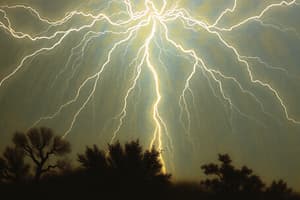Podcast
Questions and Answers
What happens when two identical rulers with different charges are brought closer together?
What happens when two identical rulers with different charges are brought closer together?
- They attract each other
- They become neutral
- They vibrate
- They repel each other (correct)
What causes a rubber balloon to stick to a wall after being charged?
What causes a rubber balloon to stick to a wall after being charged?
- Presence of air currents
- Static discharge
- Magnetic attraction
- Induced positive charge in the balloon (correct)
What is the effect of electrons jumping from one material to another?
What is the effect of electrons jumping from one material to another?
- Static discharge (correct)
- Formation of a chemical bond
- Increase in temperature
- Creation of light
How do identical charges interact with each other?
How do identical charges interact with each other?
Why are petrol and liquid fuels connected to an earthing cable during fueling at gas stations and airports?
Why are petrol and liquid fuels connected to an earthing cable during fueling at gas stations and airports?
What is the key characteristic of static electricity?
What is the key characteristic of static electricity?
What happens to the electrons during the process of generating static electricity?
What happens to the electrons during the process of generating static electricity?
Why does one material become positively charged and the other negatively charged during the generation of static electricity?
Why does one material become positively charged and the other negatively charged during the generation of static electricity?
Which type of materials allow the flow of electrons in current electricity?
Which type of materials allow the flow of electrons in current electricity?
What did ancient Greek writings focus on related to electricity over 2000 years ago?
What did ancient Greek writings focus on related to electricity over 2000 years ago?
Flashcards are hidden until you start studying
Study Notes
Static Electricity
- Static electricity is a type of electricity that doesn't move
- It occurs in non-metal materials that are insulators
- When two different non-metal insulators, such as a cloth and a glass rod, rub against each other, they can become charged by friction
- Electrons can be removed from one material and deposited on the surface of the other, leaving one material with less electrons and a positive charge, and the other with more electrons and a negative charge
Charging and Attraction
- When a plastic rod is rubbed with a soft cloth, electrons may be transferred from the cloth to the rod, leaving the cloth positively charged and the rod negatively charged
- Like charges repel each other, while opposite charges attract each other
- Holding the cloth used for charging near to the rod will attract it toward the cloth
Real-Life Examples
- Brushing your hair can cause the brush and hair to take on opposite charges, making them attractive to each other, which can cause a crackle or sparks
- Removing clothing made of certain fabrics can cause a static electric charge
- Rubbing a rubber balloon against a cloth or hair can make it stick to a wall due to induced attraction
- Holding a freshly charged plastic comb next to a thin stream of water from a tap shows a similar effect of induced attraction
Safety Precautions
- Static sparks can be dangerous and ignite flammable liquids
- Petrol and other liquid fuels can build up a static charge as they flow through a plastic pipeline
- Earthing cables and safety precautions are used to prevent static sparks from igniting fuel and causing explosions during fueling operations
Studying That Suits You
Use AI to generate personalized quizzes and flashcards to suit your learning preferences.




